Peremyshliany
Peremyshliany (Ukrainian: Перемишляни, Polish: Przemyślany, Yiddish: פרימישלאן) is a town in Lviv Oblast (region) of Ukraine. It is administrative center of the Peremyshliany Raion. Population: 6,874 (2013 est.)[1].
Peremyshliany Перемишляни Przemyślany | |
|---|---|
City | |
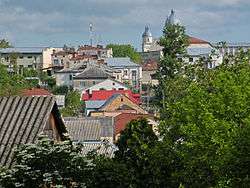 Skyline of Peremyshliany | |
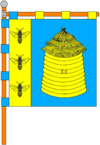 Flag 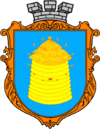 Coat of arms | |
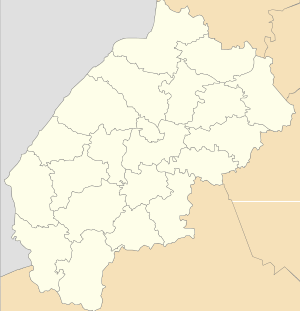 Peremyshliany 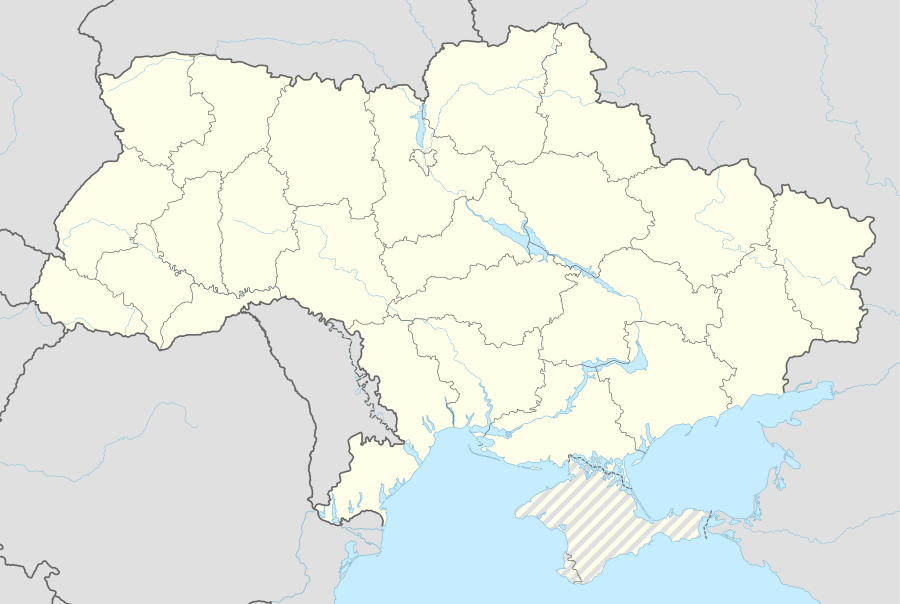 Peremyshliany | |
| Coordinates: 49°40′12″N 24°33′34″E | |
| Country | |
| Oblast | |
| Raion | Peremyshliany Raion |
| First mentioned | 1437 |
| Magdeburg rights | 1623 |
| Population (2013) | |
| • Total | 6,874 |
| Time zone | UTC+2 (EET) |
| • Summer (DST) | UTC+3 (EEST) |
Przemyślany, as the town is called in Polish, was first mentioned as a village in 1437. Until the Partitions of Poland (1772), it was part of Poland's Ruthenian Voivodeship. In 1623, Przemyslany received Magdeburg rights. In 1772 - 1918, it belonged to Austrian Galicia, and in 1918, it returned to Poland. In the Second Polish Republic, it was the seat of a county in Tarnopol Voivodeship. The town had a Jewish population of 2,934 in 1900.[2]
Famous natives
- Naftule Brandwein, klezmer musician
- Wojciech Filarski (1831 - 1898), Polish philosopher, rector of the Lwow University
- bl. Omelian Kovch (1884–1944), Ukrainian priest and martyr murdered at the Majdanek death camp.
- Wilhelm Reich (1897–1957), psychoanalyst and natural scientist was born in the village of Dobrzanica (now Dobryanichi), in the Peremyshliany district.
- Adam Daniel Rotfeld Polish diplomat and Foreign Minister.
- Baruch Steinberg (1897-1940), Rabbi killed in Katyn Massacre
- Vilunya Diskin (b. 1942), Holocaust survivor, founding member and author of Our Bodies, Ourselves[3][4]
Gallery
 Main street of Peremyshliany
Main street of Peremyshliany Omelian Kovch monument in Peremyshliany
Omelian Kovch monument in Peremyshliany Local school and Taras Shevchenko monument
Local school and Taras Shevchenko monument Church of St. Peter and St. Paul
Church of St. Peter and St. Paul Peremyshliany old town
Peremyshliany old town St. Nicholas Church
St. Nicholas Church
gollark: But is the whole concept of factions a particularly good one?
gollark: and maybe drop the factions thing.
gollark: * modpack
gollark: Also, change the modapck.
gollark: The premade-bases idea is kind of horrible too; a basic starter kit could work.
References
- Чисельність наявного населення України [Actual population of Ukraine] (in Ukrainian). State Statistics Service of Ukraine. Retrieved 21 January 2015.
- JewishGen.org
- Diskin, Vilunya (December 2012). "Once Orphaned, Thrice Adopted With The Songs of the Sabbath Echoing". The Galitzianer. 19: 16–18.
- Antler, Joyce (2018). Jewish Radical Feminism: Voices from the Women's Liberation Movement. New York: New York University.
External links
This article is issued from Wikipedia. The text is licensed under Creative Commons - Attribution - Sharealike. Additional terms may apply for the media files.